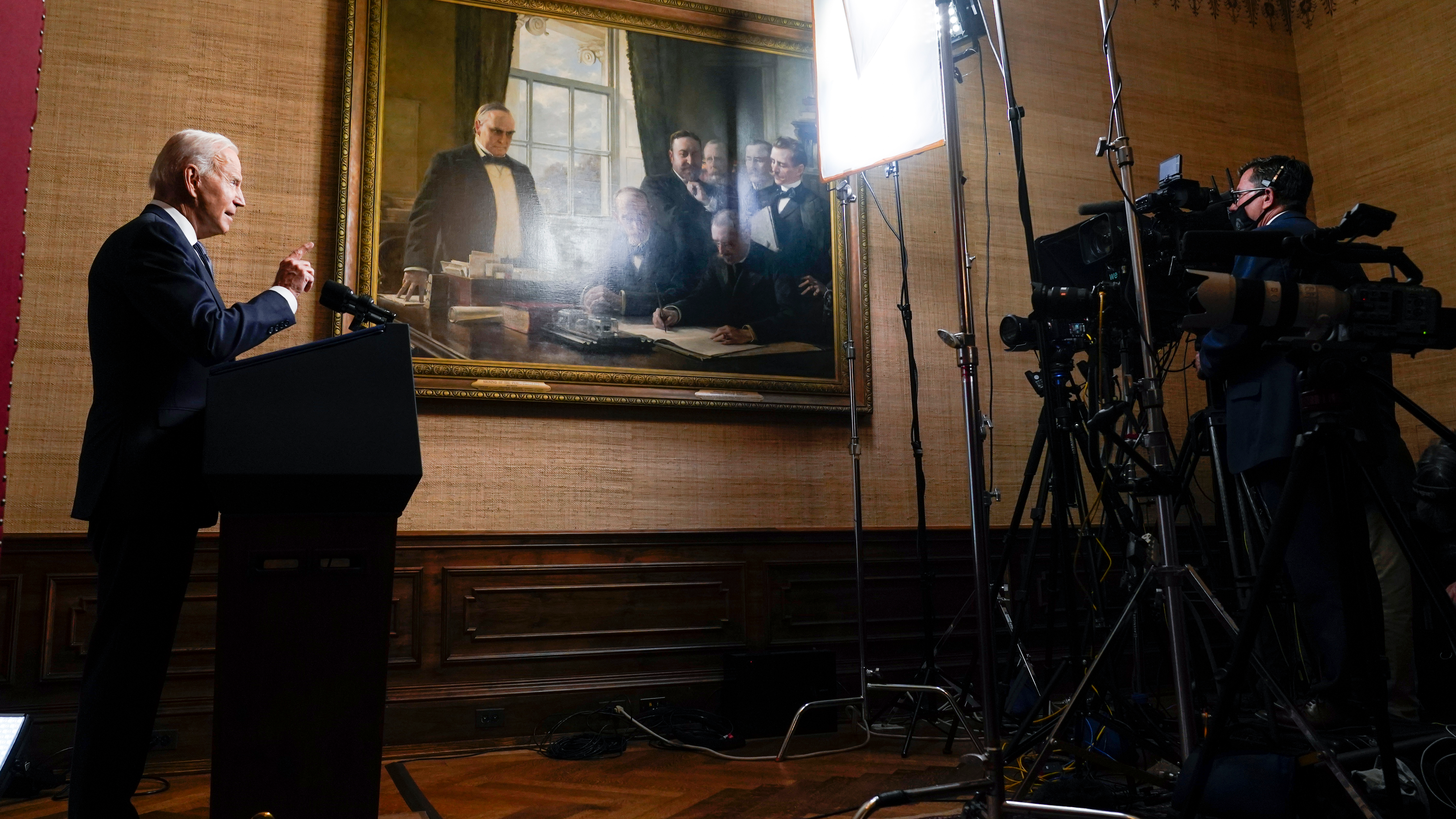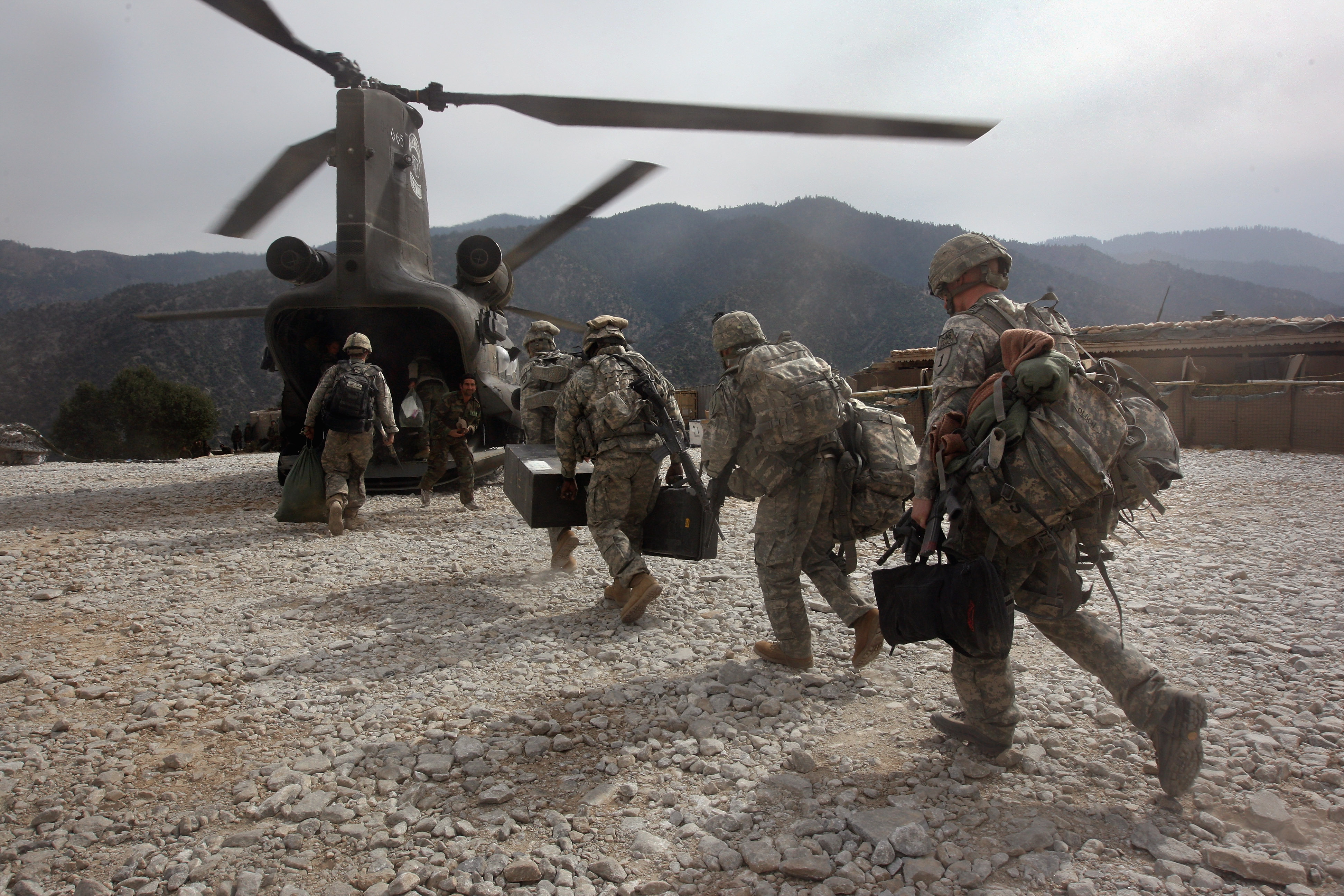
U.S. President Joe Biden speaks in the White House about the withdrawal of U.S. troops from Afghanistan in Washington, D.C., April 14, 2021. /Getty
U.S. President Joe Biden speaks in the White House about the withdrawal of U.S. troops from Afghanistan in Washington, D.C., April 14, 2021. /Getty
Editor's Note: Martin Jay is a freelance journalist based in Morocco. The article reflects the author's opinions, and not necessarily those of CGTN.
When U.S. troops pull out of Afghanistan, a new Taliban leadership will ultimately take over the present day government. The real worry though is not Al Qaeda but who the Taliban team up with as their regional superpower.
Is Joe Biden settling scores within his own party by blithely plowing ahead with his Afghanistan policy or making a deft political move to minimize his own political demise when this troubled country returns to Taliban rule?
The opaque comments by Hillary Clinton in an interview with CNN are odd. Clearly she is trying to say that Biden's announcement that all U.S. troops will pull out before September 11 is a great mistake, but can't quite find the intellectual zeal to explain why.
To be fair, she is right. Biden's pullout is a huge mistake but not simply for the Taliban takeover of Afghanistan which she suggests is imminent. There are other factors, but chief among them is that the U.S. has set a horrifyingly poor message to all insurgent groups in the region: "be patient, we can be defeated by playing the longer game. ”
Why do all U.S. presidents like to place time limits on such interventions? Surely if it was a right and just move to invade a country run by Islamic lunatics at the beginning, the arguments remain the same 10, 20, 30 years later?
The problem with U.S. troops in Afghanistan is that quite apart from them not being part of a secondary program of governance; their very presence was supporting Afghanistan.
The Kabul elite are hated by just about everyone who lives more than five clicks out of Kabul and so the more years U.S. troops were there propping them up and their graft, the more resentment grew from the masses who came to accept the Taliban. After 20 years there, a peace process, which can be attributed to the incumbent Afghan President Ashraf Ghani who started it in 2018, has made the role of U.S. troops even more futile.
The Taliban are no longer the enemy and, in the short term, are seen as partners in assuring that insurgent groups like Al Qaeda can't export their dirty work outside of the borders of this vast country often called the "graveyard of empires. ”
Vietnam choppers
Yet it's a tenuous and fragile condition that holds the entire deal together and allows the U.S. the window of opportunity to actually exit without the media sensation of being losers, as was the case in Vietnam when U.S. troops finally pulled out.
The Biden deal he largely inherited from the previous administration is all about saving face and keeping America's prestige in the region. And the Taliban are certainly the enemy, make no mistake.
From now on, the country will be observed from a distance and the risk to American lives practically zero.
But the Biden move is a poor one. And too little too late, many could argue. It was after all Biden who insisted on troop withdrawal in 2009 when Obama came into office. He was defeated by Hillary Clinton who insisted on the opposite strategy. If however, he might have won that argument then, when the Taliban had only a fraction of the power they now wield, Biden would not be in the quandary that he is now in.
The Kabul government has only a matter of months left before it inevitably falls to the Taliban who will consider it their historical place to retake power which they lost to the Americans in 2001.
The difference this time is that they won't make the same mistake as they did before and will look for regional superpowers who can support them as the U.S. almost certainly backs a rebel faction of present day Afghan army soldiers who will lose their jobs when the capital falls.

U.S. soldiers board an Army Chinook transport helicopter after it brings fresh soldiers and supplies to the Korengal Outpost in the Korengal Valley, Afghanistan, October 27, 2008. /Getty
U.S. soldiers board an Army Chinook transport helicopter after it brings fresh soldiers and supplies to the Korengal Outpost in the Korengal Valley, Afghanistan, October 27, 2008. /Getty
Do something, George
Huge mistakes were made by George W. Bush when he sent U.S. troops there. The entire premise was actually not really truthful in the first place and quite well known among foreign policy hacks as more about his father's frustration when President of having to deal with the stubborn Taliban who wouldn't agree to an energy deal in the early 90s which U.S. companies would manage.
The 9/11 attacks made hawks advising the young Bush push the button and do "something." Bush probably thought that a very short campaign would follow.
A long war with insurgents was not expected which perhaps explains the erroneous policy of a "military only " strategy that bypassed democratization, building internal security and doing something about Afghanistan. We lost sight.
And the same mistakes are being made by Biden's policy advisors and the same journalists who are obsessing over the role of ISIL and more significantly Al Qaeda.
Core to the peace deal hammered out in Doha – and instigated by the Afghan president Ashraf Ghani himself – is making sure that the Taliban don't assist Al Qaeda. For this, America can pull out of Afghanistan with no stigma of defeat.
Yet this isn't the real issue, which Hillary knows but perhaps doesn't want to spell out.
The real worry is that when Kabul falls, the Taliban will focus their efforts once again on being full-on enemies of the U.S. And at this point, it is quite likely that Iran will support their efforts, especially if a new hardcore president is sworn in on June 18 and all bets are off for a new Iran deal.
Biden's big gamble
Biden's failure to take the bull by the horns and turn the Doha Peace process in a different direction are craven and poorly judged. He is unwittingly investing in a new, emboldened Taliban who will certainly wreak havoc in the region once they take power.
Biden is gambling on so much, but mainly a civil war there not affecting the U.S. or its allies and that America can cover Afghanistan from Qatar. But there are no more U-turns for him to take.
Unlike in 2013, where Obama was forced to send troops back to Iraq after a U.S. withdrawal fanned the flames of an ISIL uprising – which had its roots based on another huge mistake by Bush who refused to pay the salaries of Saddam's regular army in 2003 – Biden will not follow.
The option won't be there if 20 years of guesswork culminates in the Taliban using Iran in the same way that Assad did on the ground and perhaps even in the air. But when that day comes, he probably won't be in the Oval office. And perhaps that's what Biden and Hillary have also figured.
(If you want to contribute and have specific expertise, please contact us at opinions@cgtn.com.)

